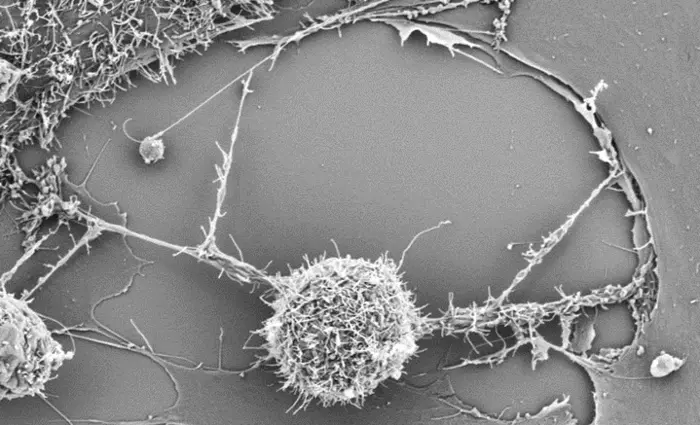Summary: University of Pittsburgh researchers have unveiled a new approach to immunotherapy by blocking cancer cells’ metabolic byproducts from sapping the energy of immune cells. The study, published in Nature Immunology, shows that preventing T cells from absorbing lactic acid can reinvigorate their cancer-fighting abilities, offering a potential new direction for cancer treatment.
Journal: Nature Immunology, November 8, 2024, DOI: 10.1038/s41590-024-01999-3 | Reading time: 4 minutes
A New Approach to Fighting Cancer
Cancer cells have a sneaky way of wearing down the immune system’s T cells that fight against them. They produce lactic acid as a byproduct of their growth, which tired T cells absorb, further depleting their energy. Now, researchers at the University of Pittsburgh and UPMC Hillman Cancer Center have found a way to break this cycle.
“Blocking access to inhibitory metabolites is a completely new take on how we can reinvigorate the immune system,” explains Greg Delgoffe, senior author of the study published in Nature Immunology. “We often think of exhausted T cells being useless, but this study shows that we can actually get juice out of these cells by blocking negative effects of the tumor microenvironment.”
Beyond Traditional Immunotherapy
Current immunotherapy treatments mainly work by releasing “brakes” on immune cells through drugs called checkpoint inhibitors. While these treatments have helped some patients, they haven’t been as successful as hoped across all cancers.
“Checkpoint inhibitors, which are the main weapons in our immunotherapy arsenal, have been incredibly successful for some patients with certain cancers, but there have also been a lot of failures,” notes Delgoffe. “There’s only so much you can do by taking your foot off the brake.”
A New Target Discovered
The research team identified a protein called MCT11 that imports lactic acid into T cells. When they blocked this protein in mice, either by deleting its gene or using an antibody, the T cells showed improved function and better tumor control in several cancer types, including melanoma, colorectal carcinoma, and head and neck cancer.
The approach proved even more effective when combined with existing immunotherapy treatments. Since MCT11 is almost exclusively expressed in exhausted T cells concentrated in tumors, treatments targeting it might have fewer side effects than traditional immunotherapies that affect T cells throughout the body.
Looking to the Future
The researchers are now working to optimize their antibody treatment for human T cells, with the goal of testing it in clinical trials. “This research is really exciting because it’s proof-of-concept that targeting how T cells interact with metabolites in their environment can promote better outcomes in cancer,” explains Ronal Peralta, the study’s first author.
Glossary
• T cells: Immune cells that fight cancer and infection
• Immunotherapy: Treatment that helps the immune system fight disease
• Checkpoint inhibitors: Drugs that release natural brakes on immune cells
• Lactic acid: A metabolic byproduct produced by cancer cells
Reader Comprehension Quiz
1. What protein did researchers target to help exhausted T cells?
Answer: MCT11
2. How does the new approach differ from traditional immunotherapy?
Answer: It blocks T cells from absorbing energy-sapping lactic acid instead of releasing immune system “brakes”
3. Why might this treatment have fewer side effects?
Answer: Because MCT11 is almost exclusively expressed in exhausted T cells concentrated in tumors
4. What happened when researchers blocked MCT11 in mice?
Answer: T cells showed improved function and better tumor control
Enjoy this story? Get our newsletter! https://scienceblog.substack.com/
If our reporting has informed or inspired you, please consider making a donation. Every contribution, no matter the size, empowers us to continue delivering accurate, engaging, and trustworthy science and medical news. Independent journalism requires time, effort, and resources—your support ensures we can keep uncovering the stories that matter most to you.
Join us in making knowledge accessible and impactful. Thank you for standing with us!

